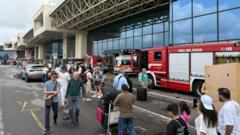Israel's military has urged medical officials and international organizations to prepare for the evacuation of one million residents of Gaza City, signaling a major offensive to occupy the area. In a statement, military officials advised that adjustments are being made to southern Gaza hospitals to accommodate evacuees, but the Hamas-run health ministry has vehemently opposed any measures that threaten the existing health system. Amidst heavy bombardments in eastern Gaza, Prime Minister Benjamin Netanyahu is navigating widespread opposition while planning to evacuate residents to shelters in southern Gaza. Local residents, however, express reluctance to leave, citing the dangers of displacement and ongoing conflict.
Israel Prepares for Gaza City Evacuation Amid Rising Tensions

Israel Prepares for Gaza City Evacuation Amid Rising Tensions
Israel's military issues warnings for the evacuation of Gaza City's residents ahead of a looming offensive.
Israel's military is notifying medical and humanitarian groups to ready for a Gaza City evacuation as preparations for an offensive intensify. The health ministry has rejected actions that could undermine its capabilities.
Israel's military has begun communicating with medical authorities and international aid operations, instructing them to prepare for the imminent evacuation of Gaza City's one million residents. This preemptive measure comes ahead of a significant military offensive aimed at occupying the city. An official statement indicated that changes are being made to hospitals in southern Gaza to accommodate incoming patients. However, Gaza’s Hamas-controlled health ministry has expressed strong opposition to any actions that could diminish the functioning of its health services, criticizing the move as harmful to the local populace.
Reports from Gaza indicate intense bombardment occurring primarily in the eastern neighborhoods, following the initiation of military operations. Israeli Prime Minister Benjamin Netanyahu has been in discussions with security officials to firm up strategies despite considerable public discontent both domestically and internationally. Following the collapse of ceasefire negotiations last month, Israel declared its intent to establish control over the entire Gaza Strip, which has led to heightened tensions and fears of humanitarian crises.
The military asserts plans to relocate the entire population of Gaza City to shelters in the south while simultaneously launching its offensive. Preparations reportedly include enhancing hospitals and medical infrastructures to manage increased patient influx and ensure adequate medical supplies. However, aid organizations and the UN have highlighted that hospitals in the south are already stretched beyond capacity.
Motasem Dalloul, a journalist based in Gaza, reported a series of Israeli airstrikes causing destruction, while residents are urged to evacuate to supposed "safe zones" in the south—a claim met with skepticism by locals who feel endangered irrespective of location. Protests within Gaza City echo widespread calls for an end to the war, with participants expressing their exhaustion and refusal to leave their homes amidst destruction.
As mediators in Qatar and Egypt work towards a ceasefire agreement, families of hostages held by Hamas are advocating for a deal to expedite the return of their loved ones. Despite available offers for a truce, including the release of hostages, Israel insists on a comprehensive solution that would secure the release of all captives. Meanwhile, the ongoing military campaign, activated in response to Hamas's attacks on October 7, has led to significant casualties within Gaza.
UN Secretary-General António Guterres has reiterated the urgent need for a ceasefire to prevent further escalations of violence, warning against the extensive loss of life that renewed offensives may bring. As the situation escalates, the international community watches closely, with growing concerns over the humanitarian implications of the ongoing conflict in Gaza.





















